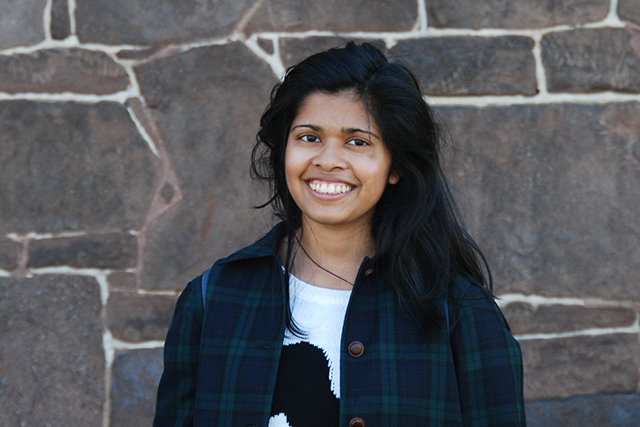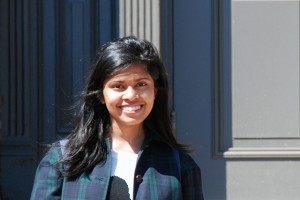After Studying Abroad, Mummini ’14 Hired as Health Programs Assistant in Denmark

In this issue of The Wesleyan Connection, we speak with Swetha Mummini ’14 who studied abroad last spring through the Danish Institute for Study Abroad Program. Her study abroad program hires two graduating past participants to be paid interns for the year after graduation and Mummini received the internship for the science and health programs assistant.
Q: What prompted you to study abroad in Copenhagen?
A: Macaroni and cheese. I know that sounds a bit ridiculous, but the first time I seriously considered going abroad was at the very beginning of junior year when my friend Catherine invited her friends over for baked macaroni and cheese. Over the course of the meal, her friends talked about their plans to go abroad during spring semester of junior year, and that moment served as my personal eureka moment. I realized what a unique opportunity studying abroad was and how I should take the opportunity to pursue it. That night, I was up until 4 a.m. researching programs and trying to find the perfect fit. Denmark has always fascinated me, especially because of its status as the happiest country in the world and its welfare state. The program that I chose, the Danish Institute for Study Abroad (DIS), also offered a wide variety of health science and public health classes that appealed to me.
Q: What did you like about the DIS program in particular?
A: For premedical students, DIS has a unique program called Medical Practice and Policy. It’s a very hands-on program that exposes students to the fundamentals of clinical medicine and the European healthcare system. By participating in the program, I was able to get clinical exposure that I wouldn’t necessarily be able to experience in the U.S. I learned how to take a patient’s case history and formulate a diagnosis. I also learned how to perform basic medical procedures, such as taking an ultrasound and drawing blood. To give students a broader understanding of healthcare policy, our class also took a weeklong trip to Vienna and Budapest where we heard from physicians and other medical specialists about the challenges in their healthcare systems. The program definitely helped solidify my choice to be a physician. Besides the classes, another amazing aspect of my program was the homestay option. Nothing else teaches you more about Danish culture and customs than the chance to live with a Danish family. I grew very close to my host family and living with them exposed me to a different ideology, giving me the opportunity to evaluate my own priorities and values.
Q: Upon your return you were hired to be a “science and health programs assistant” after graduation. What will you be doing in that position?
A: My job will allow me to return to Denmark next year to work as a department assistant in the science and health division, which has programs in clinical medicine, public health, biomedicine and neuroscience. A good chunk of my job will entail performing general office administrative tasks. I also will be acting as a liaison between student and faculty members. The most interesting part of my job will be planning and co-leading study tours, which are weeklong academic and cultural excursions to foreign countries.

Q: How does it feel to have definite post-grad plans?
A: It is an incredible feeling of relief. I started to panic about finding a job the day right before spring break started. Fortunately, that was the same day that I received a job interview offer from DIS. I feel so lucky and grateful to have gotten my dream job – especially since it was the first (and only!) job that I applied to since senior year started. But since the position is only for 13 months, when I come back home in September 2015, I will probably be scrambling to join the job hunt while simultaneously applying to medical school.
Q: What are you currently studying at Wesleyan?
A: I am a biology and neuroscience and behavior double major.
Q: Did you write a thesis?
A: I chose not to write a thesis. Part of the reason I didn’t write a thesis was because I chose to go abroad. Since I did not seriously consider going abroad until fall semester of junior year, my abrupt decision caused me fall behind in completing both my majors and finishing premedical requirements. So I had to cram to finish everything this year and even though it was a bit stressful at times, looking back, studying abroad made it so incredibly worth it.
Q: Are you involved with any extracurricular activities?
A: I currently serve as president of the Wesleyan chapter of the American Medical Student Association. This past year, we organized a bone marrow registry drive and invited numerous medical students and physicians to speak about their very diverse experiences in the practice of medicine. In previous semesters, I conducted developmental biology research in Professor Ann Burke’s lab, volunteered with Wesleyan Science Outreach, and served as a teaching assistant and tutor.
#THISISWHY

